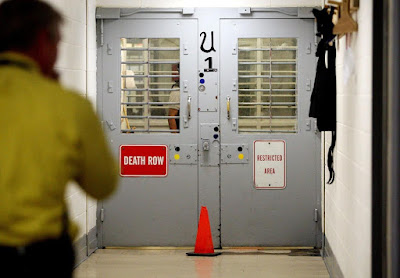As the
trial challenging South Carolina’s execution methods began on August 1, 2022, a review of the state’s death penalty by the Greenville News revealed a pattern of discrimination, geographic arbitrariness, and high error rates in the implementation of the punishment.
In a two-part examination, reporter Kathryn Casteel analyzed racial and county demographics on death row, reversal rates in capital cases, and the timing of death sentences to provide context for the state’s efforts to institute the electric chair and firing squad as its primary execution methods.
Four of South Carolina’s 35 death-row prisoners are suing the state to block a law that would force them to choose between electrocution and firing squad as methods of execution. One of the men, Richard Moore, wrote in an April legal filing, “I believe this election is forcing me to choose between two unconstitutional methods of execution.” Executions are on hold while a court hears the prisoner’s case, but Casteel points out that the 31 men not involved in the suit are all inelegible for execution for various procedural reasons. Thirteen prisoners are in the post-conviction stage of appeals, four have had their death sentences vacated, six cases are in federal appeals, three are either incompetent to be executed or incompetent to stand trial, and the remaining five have some other legal barrier to execution.
The state’s high rates of error and misconduct in imposing the death penalty underscore the importance of the prisoners’ pending appeals. “More than 60% of cases that have gone into the South Carolina death penalty process have eventually been reversed, so the appellate courts are saying that the trial courts are getting this wrong quite a lot of the time,” said Madalyn Wasilczuk, assistant professor at the University of South Carolina School of Law. “It’s one really important reason why we need to have this review.” In particular, prosecutorial misconduct has contributed to 29 out of 81 death-penalty reversals, according to a 2016 study by Cornell Law professor John Blume, former director of the South Carolina Death Penalty Resource Center, and Justice 360’s executive director, Lindsey Vann.
A handful of prosecutors in the Palmetto State have been responsible for a disproportionate number of death sentences. Just four prosecutors sent 14 of the 35 current prisoners to death row. A single prosecutor, Donnie Myers, secured 39 death sentences against 28 defendants over the course of four decades. Courts found misconduct in at least 18 of his cases. In one case, involving an infant victim, he staged a funeral procession, placed a black shroud over a crib, and warned the jury that, without a death sentence, it would be “open season on babies in Lexington County.” The South Carolina Supreme Court reversed the sentence, calling his argument “overly zealous.”
Racial bias is also evident in the state’s use of the death penalty, which values white lives more than Black lives and disproportionally subjects defendants of color to capital sanctions. In the past fifty years, the death penalty has been overwhelmingly reserved for cases with white victims (80.9%), while just 16.9% of South Carolina death sentences have been imposed for the murder of a Black person. While the state’s population is only about one-quarter Black (27%), nearly half (46.9%) of defendants sentenced to death since 1972 have been Black.
Blume said that bias has historical roots: “That’s a pattern that persisted since the beginning of the modern era, and that has also persisted in the pre-modern era, throughout the history of the death penalty in South Carolina from colonial times forward. It was almost all exclusively reserved for people that kill white people, and primarily Black people that kill white people.”
Casteel’s review also highlighted the importance of defense representation. The vast majority of death sentences in South Carolina were imposed before the state created an office devoted to capital defense. Since 2010, just three people have been sentenced to death. “There are very few people coming on the row,” said Blume. “Some of these people are going to win in their appeal, or some of them aren’t going to be executed because they’re incompetent. Probably some of them will be executed. But eventually I think the number’s going to become so small, at some point somebody’s gonna go, ‘Why are we doing this?’”
🚩 | Report an error, an omission, a typo; suggest a story or a new angle to an existing story; submit a piece, a comment; recommend a resource; contact the webmaster, contact us:
deathpenaltynews@gmail.com.
Opposed to Capital Punishment? Help us keep this blog up and running! DONATE!
"One is absolutely sickened, not by the crimes that the wicked have committed,
but by the punishments that the good have inflicted." -- Oscar Wilde














